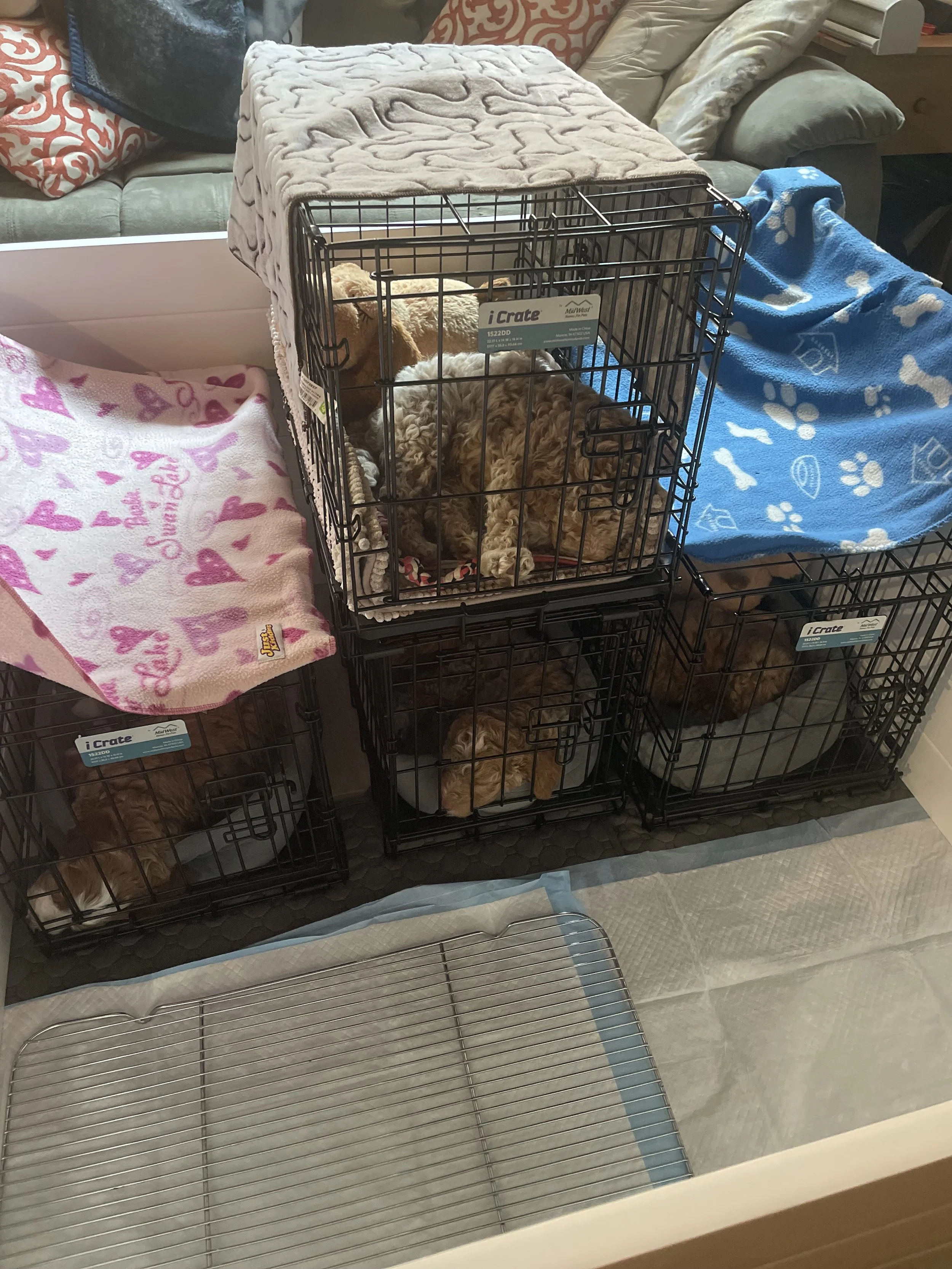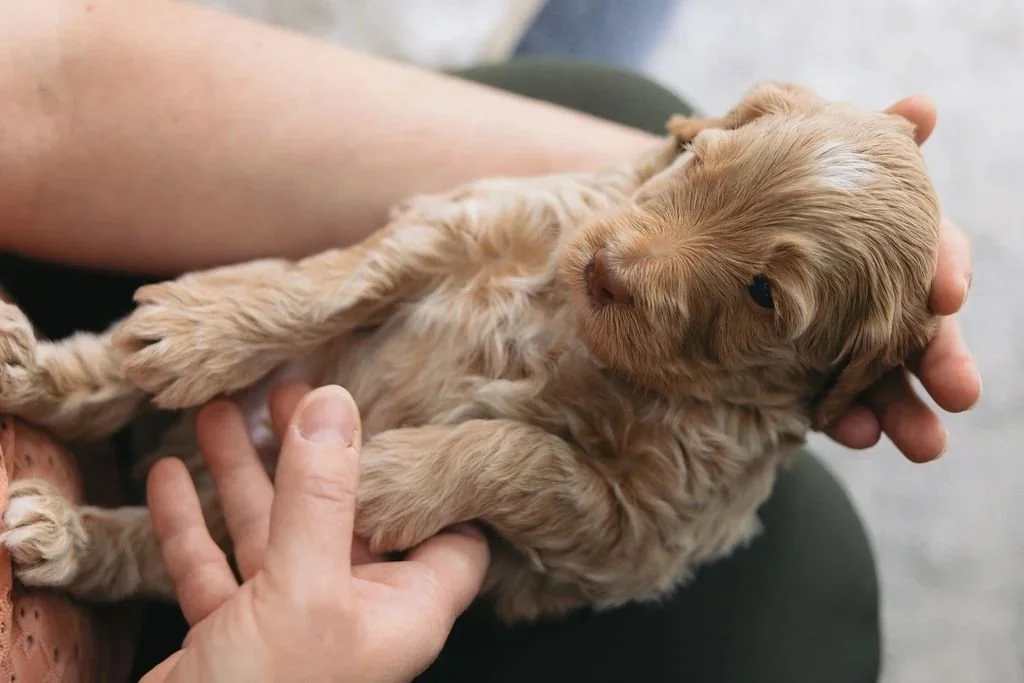
Olive’s Doodles Puppy Curriculum: Raising Emotionally Balanced, Confident Dogs
At Olive’s Doodles, our goal is to raise well-rounded, confident, and loving companions who thrive in family environments. Our program is thoughtfully designed with inspiration from Jeanette Forrey’s Badass Breeder Service Dog Curriculum and has been adapted to meet the specific needs of our Doodle puppies and their future families. This curriculum is designed to create emotionally stable, confident, and adaptable puppies. Each part of the curriculum plays a role in shaping well-rounded dogs that thrive in family homes, service work, or therapy settings. At its core, this curriculum is a science-based, heart-led approach to raising puppies that are not only cute and cuddly but also emotionally stable, confident, and ready for real life. We believe in intentional puppy raising, not just keeping them healthy, but also preparing them emotionally and mentally for the world. Here's what that looks like:
Early Neurological Stimulation (ENS) and Scent Introduction (ESI)
Starting at just three days old, our puppies begin Early Neurological Stimulation (ENS), a set of gentle handling exercises that support healthy brain development, strengthen their immune systems, and improve their ability to handle stress later in life.
Alongside ENS, we introduce Early Scent Introduction (ESI), exposing puppies to a new scent each day. This helps strengthen their scent recognition and promotes curiosity and sensory awareness.
Early Handling and Grooming Preparation
By two weeks of age, we begin daily handling exercises to desensitize puppies to touch. We gently get them used to being touched on the face, ears, mouth, paws, and body. At three weeks, our puppies begin the 10‑Step Handling routine developed by Jeanette Forrey. This daily practice helps puppies grow comfortable with touch, making vet visits, grooming, and handling much less stressful later in life
The handling steps include:
Rub ears
Cover eyes
Open mouth and run fingers along gums
Rub belly in circular motions
Stroke down the back
Run hand and fingers along the tail
Touch all paws
Tap on nails
Run fingers around the neck and under collar or ribbon
Touch their nose
As puppies grow, the pressure of these touches is gently increased to build comfort and compliance
Because our dogs require regular grooming, we also introduce them to the tools and sensations of the grooming process early. This early work makes grooming and vet visits far less stressful as they grow.
This includes:
Nail trimming
Brushing
Bathing
Blow drying
Sanitary trims
By the time they go home, grooming has become a normal, stress-free experience.
Socialization and Environmental Exposure
During the critical socialization window (from around 3 to 8 weeks), we provide daily exposure to new sights, sounds, textures, environments, and safe challenges. Puppies experience things like:
Tunnels and steps
Unfamiliar surfaces
Noises such as thunderstorms, fireworks, or vacuum cleaners
Toys, puzzles, and sensory play equipment
They also meet people of all ages, including children, as well as other pets, ensuring they grow up confident around different types of interactions.
Potty Training Foundations
At three weeks old, we introduce a litter box system that encourages puppies to keep their sleeping area clean and use a designated space to eliminate. This early start supports faster and more successful potty training once they transition to their new homes.
Crate and Travel Conditioning
At 4 weeks old we introduce our puppies to the crate. It will start with an “open door policy” so the puppies associate the crate with something safe and comfortable. In the next few weeks, we begin short, positive crate sessions either individually or in pairs to help puppies feel comfortable and secure in a crate. For puppies traveling to their new homes, we also introduce soft-sided travel carriers to make the experience familiar and low-stress. These early steps go a long way in easing their transition to family life.
Confidence Building and Problem Solving
As part of our enrichment program, puppies are introduced to age-appropriate challenges that encourage curiosity and teach resilience. They explore minor obstacles, problem-solving games, and new environments that help them build confidence and emotional stability. We gently expose them to things that might be surprising, then support them through the experience, helping them recover calmly and confidently.
Basic Manners and Early Obedience
Our puppies begin learning important life skills before they ever leave our care. We introduce:
Name recognition
Sit and wait behaviors
Gentle grooming table manners
Impulse control during feeding and play
“Puppy, puppy, puppy” recall
These lessons set the foundation for a lifetime of good habits and easier training at home.
Temperament Testing and Personalized Puppy Matching
At seven weeks of age, each puppy undergoes a professional temperament evaluation. This assessment looks at traits such as:
Confidence
Energy level
Motivation
Toy or prey drive
Resiliency
Sight and sound sensitivity
Touch tolerance
Human focus
This allows us to make thoughtful, intentional matches between each puppy and their future family, not just based on appearance, but on personality and lifestyle compatibility.
The Result
Puppies raised through our curriculum are confident, curious, adaptable, and emotionally balanced. They are comfortable with grooming and handling, better able to handle transitions, and already familiar with key behaviors and routines.
We don’t just raise puppies, we raise companions for life.
Through this structured, heart-centered program, we help each Olive’s Doodles puppy develop the strong foundation they need to thrive as cherished family members.













